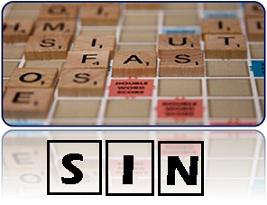Whatever Happened to Sin?
Whatever Happened to Sin?
She is a normal healthy attractive 20-something woman with a steady job – to maintain her privacy – I’ll call her Jo.
A few days ago she stood up in church and shared the story of her journey to faith. In a calm and confident tone she told of childhood belief giving way to teenage cynicism – and then a case of full-blown hedonism before the shakes set in. Who am I? Why am I here? – and so on.
All this coincided with a Gumble-moment when she was invited along to an Alpha course in a friendly flat nearby. Good stuff ensued, with many clouds lifting, but no blinding conversion. Mr Right was a factor – and a big one at that. They had met, fallen in love and moved in together. Life was sweet – why mess it up with religion?

But the hound of heaven worked overtime and before long, Jo was back knocking on heaven’s door and asking all the right questions about God, faith and Jesus. Things started to get serious as her partner (now fiancé) announced he was not prepared to marry Mother Theresa and made it clear that Jo had a tough choice to make.
Jo did. And a few days ago explained to a silent congregation the story of grace that led her to walk away from a wedding to a man she loved deeply.
I have shared a summary – there is so much more to Jo’s story – but it serves to illustrate a point. She realised that becoming a follower of Jesus meant a lifestyle revolution.
Conversion as Jo understood it was not a quick makeover a la Changing Rooms (a slap of paint and some magic touches with a piece of MDF) – but a total rebuild.
I listened to Jo telling her story with interest and gratitude to God for some wise friends who handled her well and watched and waited as the Spirit worked.
Jo reached big conclusions because God showed her that life needed to change – not because someone bullied her.
Prophets with Funny Voices⤒🔗
Analysis of contemporary Britain is never hard to come by – not least in church circles. (We used to evangelise but nowadays we analyse). But some of the sharpest comments come from unlikely prophets. Let me mention a couple. First the journalist and broadcaster John Humphreys in his thought-provoking book, ‘Devil’s Advocate’ which provides a social commentary on contemporary Britain. One chapter entitled The Victim Culture pinpoints the modern fashion for finding someone else to blame and, in his diagnosis, ‘Seeing ourselves as victims means we stop seeing ourselves as responsible’.1
A second prophetic voice comes from writer Ben Elton in his bestselling book and successful stage production ‘Popcorn’. One of the characters vents his fury at the way people studiously avoid taking any responsibility for their actions: Nothing is anybody’s fault. We don’t do wrong, we have problems. We’re victims, alcoholics, sexaholics.
Do you know you can be a shopaholic? That’s right, people aren’t greedy anymore, oh no.
They’re shopaholics, victims of commercialism. Victims! People don’t fail anymore. They experience negative success.
We’re building a culture of gutless, spineless, self-righteous, whining cry-babies who have an excuse for everything and take responsibility for nothing’.2

So far as I am aware, neither of these gentlemen has a religious axe to grind – yet the point they make is both theologically precise and pastorally accurate. They bemoan the lack of responsibility in our culture and our constant desire to point the finger at others. Good call – but what’s the cause and where’s the cure?
Lying at the root of this problem is a rejection of any sense of accountability to the God who created us and entrusted to our care the fragile gift of life.
What Humphreys and Elton describe are the consequences of Paul’s argument set out in the last part of Romans chapter 1. People have abandoned God – and once that central pillar falls, others follow.
Whatever happened to sin? There I have mentioned it. I may have got a dozen or so paragraphs into this article – but it had to pop its little head up. However non-PC sin may be nowadays, the Bible has no such embarrassment on the topic. And our abandonment of responsibility can be traced back to that three-lettered source.
Sin may not score many points on a scrabble board but it is indispensable in an accurate diagnosis of life. But whatever happened to sin? There’s a lot of it about – it’s just we don’t seem to call it that anymore.
Garrison Keillor in typically tongue-in-cheek style, tells of a Christian denomination that redrafted their Prayer of Confession to make it more user-friendly. Here’s the modernised version:
Lord, we approach Thy throne of grace, having committed acts which, we do heartily acknowledge, must be very difficult for Thee to understand. Nevertheless, we do beseech Thee to postpone judgement and give Thy faithful servants the benefit of the doubt until such time as we are able to answer all Thy questions fully and clear our reputations in Heaven.3
What the Bible Tells us About Sin←⤒🔗
No serious study of the Bible can avoid the fact it has a great deal to say on the subject of sin. Summed up in a phrase – it’s serious. The whole elaborate sacrificial system developed in the Old Testament sent a loud and clear message: God is holy – we are not.
Yet God longs for fellowship with people He created and so made a way for sin to be both covered and carried away. When Jesus came, the foreshadowings of the old covenant were fulfilled. As John the Baptist cried as he pointed to Jesus “Look, the Lamb of God who takes away the sin of the world!” (John 1:29).
Over the next few weeks millions worldwide will view Mel Gibson’s new film, ‘The Passion’, which graphically portrays the last 12 hours of Jesus’ earthly life. Many will be left with one aching question as the lights come up. Why?
If Jesus was the Son of God and held ultimate control over those who used, abused then disposed of Him – why did He choose to suffer like that?
One of Jesus inner circle of friends witnessed the crucifixion, with no respite of cinema lights coming up after a couple of hours. Peter explains the mystery of the cross of Christ in this graphic phrase: “He Himself bore our sins on the tree (cross), so that we might die to sins and live for righteousness; by His wounds you have been healed” (1 Peter 2:24). The Cross is God’s ultimate answer to sin.
Good News and Bad News←⤒🔗
The good news of God’s love is that sin has been dealt with, Jesus is risen and a new life beckons. But in order to receive the good news we need to understand that it is bad news too. We are sinners that need saving – or to be really personal – I am a sinner that needs saving.
That is a hard idea for proud people to handle. As the Bishop of Durham crisply asserts:
Often today, people don’t believe there is much wrong with the human race, and with themselves in particular. As a result, they don’t see very much need for God’s grace. Perhaps they think, God might help me out in a tight corner here or there, but basically I can get along fine without Him. All that God has to offer, it seems, is a kind of spiritual enhancement of ordinary life, a gentle enrichment of what’s already there rather than a radical rescue from imminent disaster.

The good bishop is spot on. Grace is for dirty, lost people.
So how do we tell the good news while spelling out the bad news? Some believe that you preach strong and hard – 90% law seasoned with a sprinkling of grace. Others suggest the recipe needs to be the other way round – play up the love of God and play down the idea of personal sin.
To be frank, both paths betray a view that suggest changing lives is something we do rather than something God does. By contrast, recall what Jesus said about the job of the Holy Spirit: “When He comes, He will convict the world of sin and righteousness and judgement” (John 16:8).
Our responsibility is to tell the truth and let the Holy Spirit do the job He does best. Take Jo’s story for example. The conclusion she reached about a change of lifestyle came because the Holy Spirit showed her what was needed. It is when we try to do His work for Him that the muddle sets in.
As a pastor and preacher I believe increasingly in the power of God to change people’s lives. The longer I go on the more I believe in the power of the good news. But I have learned/am learning seven important lessons along the way.
1. Teach the Bible←↰⤒🔗
Teach what is there faithfully, stick to the text and you will discover the searchlight of Scripture illuminates dark places better than anything else.
2. Be Consistent←↰⤒🔗
Treat sin as the Bible treats it – with consistency. For example, don’t become unbalanced in preaching about sexual sins yet never mention greed, being argumentative or a killer of people’s character through gossip.
3. Don’t Soft Pedal←↰⤒🔗
If God has said something is wrong – then that is what it is. Being less than honest doesn’t honour God or help people either in the short term or the long run.
4. Talk About Grace←↰⤒🔗
Jesus is full of grace and truth – and any communication of His word should embody this. Grace without truth is false. Grace and truth makes sense of each other and set people free.
5. Study what God Does←↰⤒🔗
People like Jo are invaluable and teach me so much. Find those who are new to faith and listen as they describe what Christ has done to bring them into the family of God. How did their understanding of sin, grace and conversion take shape? Listen and learn.
6. Expect the Holy Spirit to do His Work←↰⤒🔗
Experience suggests that revealing sin and pointing to the hope that is in Jesus are best left to the Holy Spirit. When it comes to radical conversion, no-one does it better.

7. Conviction or Condemnation?←↰⤒🔗
One valuable pastoral lesson is to never forget the difference between condemnation and conviction. Condemnation is the devil’s work and is a hallmark of the kingdom of darkness. It feeds on the awareness of sin but shuts out any rays of hope.
Conviction, on the other hand, is the Holy Spirit’s work as He reveals sin and points us to the answer – the empty cross of Jesus. Condemnation is like a fake bank note – utterly useless. But conviction trades in the currency of grace.
And the Bank of Heaven Deals in Nothing Less.

Add new comment